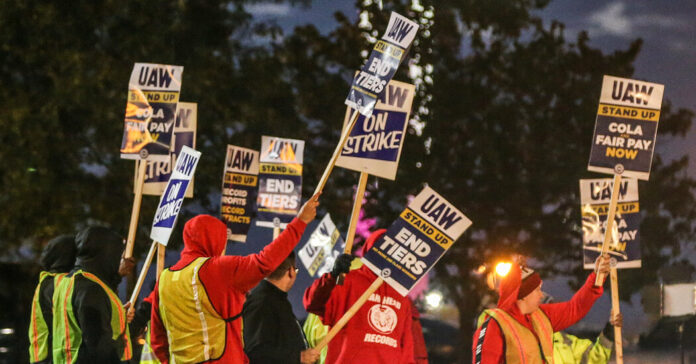Four weeks after beginning limited strikes against three major automakers, the United Automobile Workers is shifting to a more aggressive strategy, suggesting that the work stoppages could spread to more plants and possibly last for some time.
In an online video, union leader Shawn Fain said Friday that he would no longer wait to announce an expansion of strikes on Friday, as he has done so far. Further measures could come at any time.
“We’re not kidding,” Mr. Fain said. “Companies are now being notified. If they are not ready to move, we will give them a nudge.”
The union began its strikes on September 15 when workers walked out of three factories owned by General Motors, Ford Motor and Stellantis that make Chrysler, Jeep and Ram vehicles. Since then, it has gradually expanded the strike to increase pressure on companies.
Stellantis announced Friday that it is temporarily laying off another 700 workers at two Indiana plants that supply transmissions and castings to a Jeep factory in Toledo, Ohio, that was shut down by the UAW strikes. In response to the union strikes, Stellantis has laid off a total of more than 1,300 workers.
Ford laid off more than 1,900 workers as a result of the strike and GM laid off around 2,300. Ford said about 90 of its suppliers laid off about 13,000 workers.
Stellantis also said his negotiations had made progress in talks with the UAW this week. The company said it hoped to “reach an agreement as quickly as possible to get everyone back to work.”
The UAW and the automakers have been negotiating new labor contracts since July.
On Wednesday, the UAW unexpectedly asked workers to leave the Kentucky Ford truck plant in Louisville. It is the company’s largest operation and manufacturer of the highly profitable Super Duty version of its F-Series pickup trucks.
Ford said the Kentucky plant typically produces a new truck every 37 seconds and generates $25 billion in sales, about 16 percent of the company’s annual revenue.
Overall, the strike paralyzed operations at three Ford plants in Michigan, Chicago and Kentucky; two GM plants in Michigan and Missouri; and a Stellantis plant in Ohio. UAW members are also striking at 38 GM and Stellantis parts warehouses across the country.
About 34,000 of the 150,000 UAW members employed by the three companies are currently on strike.
The UAW has demanded significant wage increases and improvements in other areas of its contract, such as retirement benefits. The union also wants an end to a system that pays new hires just over half the UAW’s top wage of $32 an hour.
The union is also concerned about potential job losses as automakers ramp up production of electric vehicles. The companies have offered wage increases of more than 20 percent over four years and reduced the time it takes for a new worker to advance to top wages from eight to four years.
On Thursday, Ford officials said the company had reached the limit of what it could offer the union without hurting the company’s business and its ability to continue making large investments in electric vehicles. “Any further step will overwhelm our ability to invest in the business,” Kumar Galhotra, president of Ford’s division that makes internal combustion engine vehicles, said in a conference call Thursday.
In addition to the auto companies, UAW-represented workers at Mack Trucks also went on strike this week. Its members voted this week to authorize a strike against General Dynamics, an aerospace and defense company. The UAW also represents about 1,000 workers who have been striking at Blue Cross Blue Shield in Michigan for a month.
















